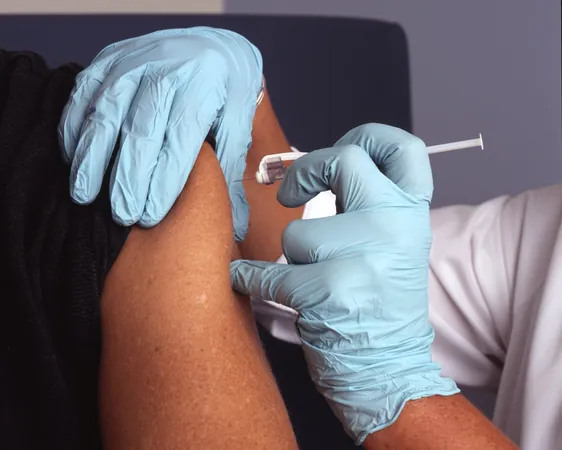
Annual COVID-19 Boosters Crucial for Protecting Immunocompromised Individuals, Says Game-Changing Study
2025-03-31
Author: Jia
Groundbreaking Study from McGill University
In a groundbreaking study from McGill University, researchers strongly advocate for annual COVID-19 vaccine booster shots specifically targeting immunocompromised individuals, revealing crucial insights that could shape public health policies.
Understanding the Risk to Immunocompromised Individuals
The study analyzed the health outcomes of 366 patients diagnosed with immune-mediated inflammatory diseases (IMIDs) such as rheumatoid arthritis, lupus, inflammatory bowel disease, and multiple sclerosis. These conditions affect over seven million Canadians, leaving patients particularly vulnerable due to the immunosuppressive medications they often depend on, which diminish their vaccine efficacy.
Key Findings Published in *Vaccines*
Published in the prestigious journal *Vaccines*, the findings reveal that 15% of the IMID patients contracted COVID-19 at least once during the one-year analysis. Significantly, those with higher antibody levels—produced in response to the vaccine—exhibited a markedly lower susceptibility to infection.
Expert Insights on Vaccine Efficacy
“Our findings highlight why booster doses are so critical; immunity naturally wanes over time, and sustaining elevated antibody levels is vital for protection against COVID-19,” explained Dr. Sasha Bernatsky, senior author of the study. “It's a common misconception that recovery from COVID-19 guarantees long-lasting immunity, which our data do not support.”
Impact on Vaccine Recommendations in Canada
This research further contributes to the ongoing discourse on vaccine recommendations in Canada, with health authorities relying heavily on its robust data to endorse yearly booster shots even five years after the pandemic commenced.
Innovative Methodology for Accurate Analysis
The study's methodology sets it apart; unlike prior investigations that depended on self-reported infections or hospital data, this analysis employed saliva PCR tests and precise antibody measurements. This innovative approach granted a clearer understanding of infection risks among the immunocompromised population.
Navigating Post-Pandemic Realities
As the pandemic evolves, the reality of COVID-19 remains stark, particularly for vulnerable communities. “The first mRNA vaccines were effective initially, but as immunity declines and new variants arise, breakthrough infections are on the rise. COVID-19 has become a seasonal threat similar to influenza that requires our attention,” Bernatsky adds.
Collaborative Efforts for Public Health
This extensive research collaboration involved esteemed institutions such as the University of British Columbia, Université Laval, McMaster University, Mount Sinai Hospital, and the University of Manitoba, highlighting the commitment to protecting some of the most vulnerable populations in Canada.
Significance of the Findings
As the world transitions into a post-pandemic era, the implications of these findings are significant; understanding the ongoing risks for immunocompromised individuals is essential for promoting public health and ensuring that the most susceptible among us receive the necessary safeguards. Don’t overlook these revelations – they could save lives!

 Brasil (PT)
Brasil (PT)
 Canada (EN)
Canada (EN)
 Chile (ES)
Chile (ES)
 Česko (CS)
Česko (CS)
 대한민국 (KO)
대한민국 (KO)
 España (ES)
España (ES)
 France (FR)
France (FR)
 Hong Kong (EN)
Hong Kong (EN)
 Italia (IT)
Italia (IT)
 日本 (JA)
日本 (JA)
 Magyarország (HU)
Magyarország (HU)
 Norge (NO)
Norge (NO)
 Polska (PL)
Polska (PL)
 Schweiz (DE)
Schweiz (DE)
 Singapore (EN)
Singapore (EN)
 Sverige (SV)
Sverige (SV)
 Suomi (FI)
Suomi (FI)
 Türkiye (TR)
Türkiye (TR)
 الإمارات العربية المتحدة (AR)
الإمارات العربية المتحدة (AR)